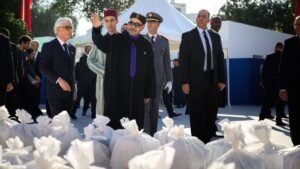Morocco Sets 2040 Target to Phase Out Coal, Accelerates Shift to Renewable Energy

Marrakech, The Gulf Observer: Morocco has formally committed to phasing out coal-fired power generation by 2040, contingent upon receiving sufficient international financial and technical support, according to its updated Nationally Determined Contribution (NDC). The country has also pledged an unconditional coal phase-out during the 2040s, marking the first time it has set an official timeline since joining the Powering Past Coal Alliance (PPCA) in 2023.
In an October 23 statement, the PPCA announced that Morocco plans to triple its renewable energy capacity to exceed 15 GW by 2030. As part of this ambitious energy transition, the country will also prioritize grid modernization and the expansion of energy storage infrastructure.
Currently, coal remains the dominant source of electricity in Morocco, accounting for 59.3% of the energy mix in 2024—a marked decline from 70% in 2022. However, renewable energy sources such as wind and solar have shown significant progress, providing nearly 25% of electricity generation in 2024, compared to just 9% in 2015.
“The gradual phase-out of coal power, combined with the rapid scale-up of renewable energy, will reinforce our energy security and drive clean economic and social growth,” stated Leila Benali, Minister of Energy Transition and Sustainable Development. She confirmed that Morocco has already halted plans for any new coal-fired power plants. “By employing the right technical and financial levers, as presented at COP28, we are convinced that Morocco can achieve this objective and build a value-creating economy that benefits everyone,” she added.
Morocco’s transition toward clean energy began with its 2009 National Energy Strategy, which aimed to raise the share of renewables to 52% by 2030. This ambition was elevated in the country’s 2021 NDC, which targets 70% renewable power by 2050. Morocco also committed to stopping new coal developments at COP26 in Glasgow.
To advance these objectives, the government has introduced policy measures such as tenders and auctions for large-scale solar and wind projects, the establishment of the Moroccan Agency for Sustainable Energy (MASEN) as a dedicated facilitator for investors, and the implementation of Public-Private Partnership financing mechanisms.
Julia Skorupska, Head of Secretariat at PPCA, highlighted Morocco’s transition “from a heavy dependence on costly fossil fuel imports to a future powered by home-produced renewable energy.” She added that setting a coal phase-out date “paves the way for cleaner air, good quality jobs, and cheaper energy.”
Climate expert Rachid Ennassiri, Co-Founder and Director of the Imal Initiative for Climate and Development, described the conditional 2040 coal phase-out as “a decisive evolution in Morocco’s climate policy.” He emphasized that the new target transforms “what was once an implicit direction into a clear strategic goal” and signals readiness to address plant retirements, contractual adjustments, and a just transition supported by global climate financing.
The announcement aligns with a broader global momentum toward decarbonization. Earlier this month, renewable energy sources generated more electricity globally than coal for the first time in history. Solar and wind growth exceeded global energy demand in the first half of 2025, while additions to the global coal fleet fell to their lowest level in over two decades in 2024.
As part of international efforts, the PPCA will unveil a Plan to Accelerate Coal Transitions at COP30, outlining targeted actions to fast-track coal-to-clean energy shifts ahead of the next Global Stocktake in 2028.
Morocco’s coal phase-out plan underscores its growing leadership in climate action and its determination to build a sustainable, resilient, and inclusive energy future.


